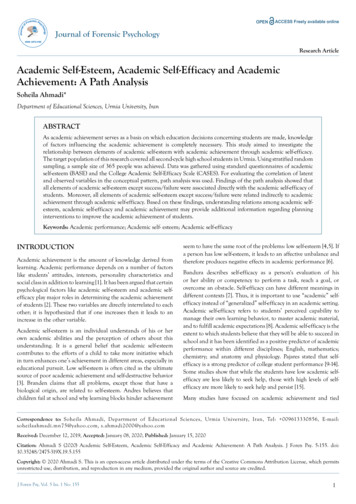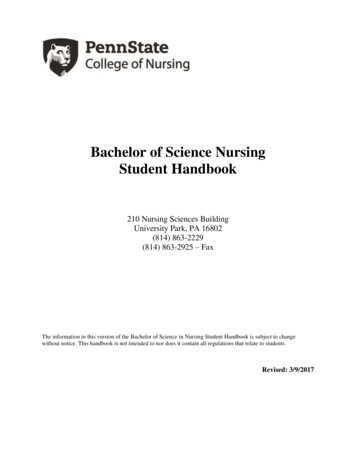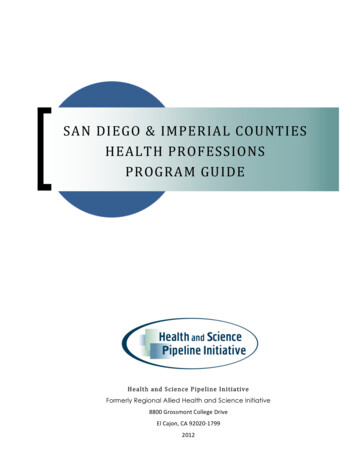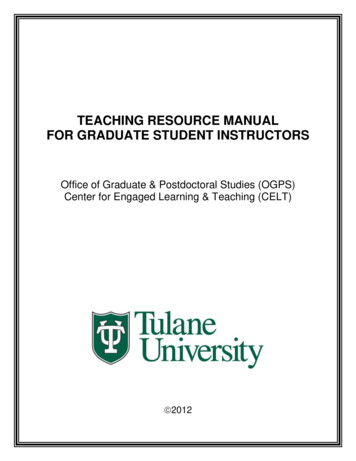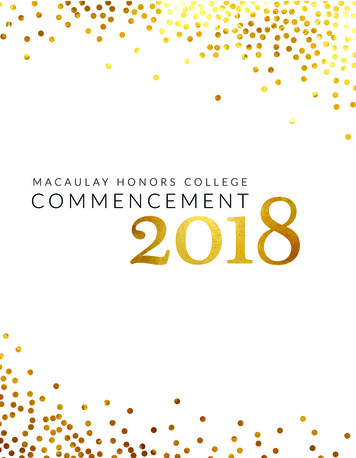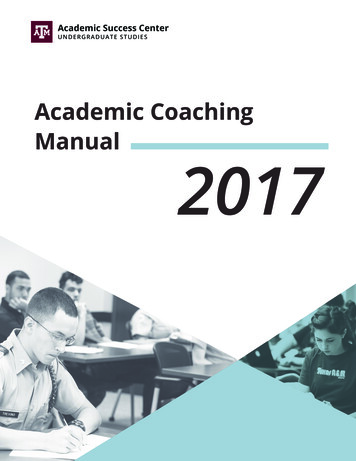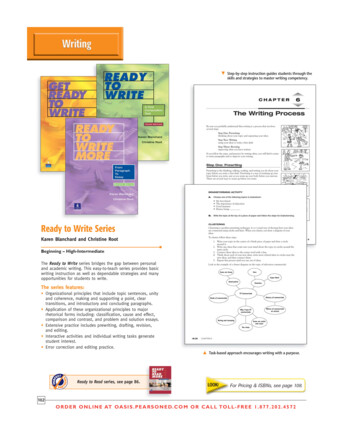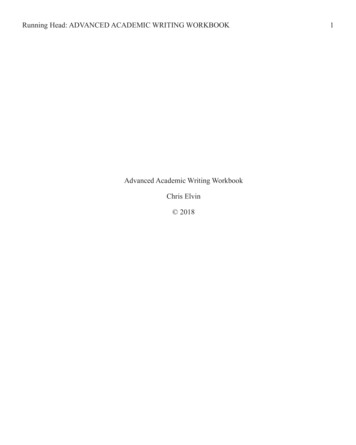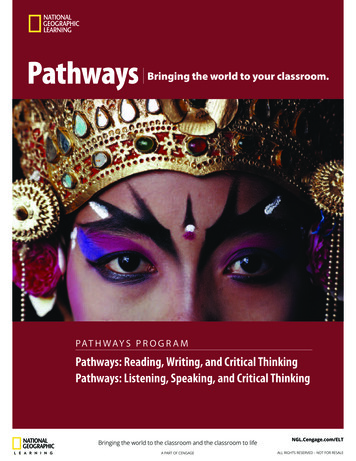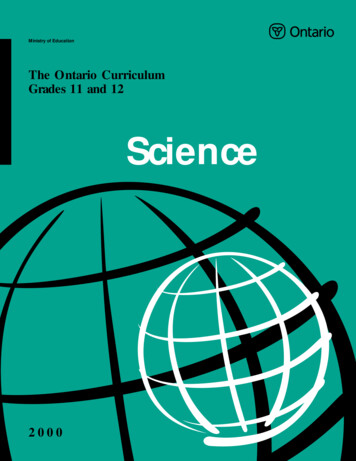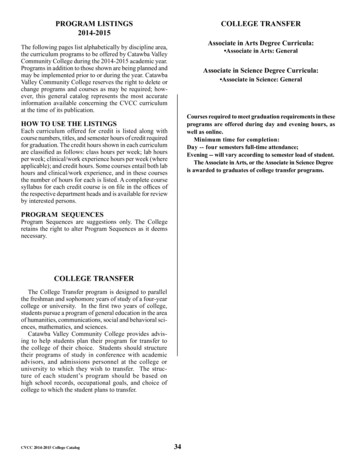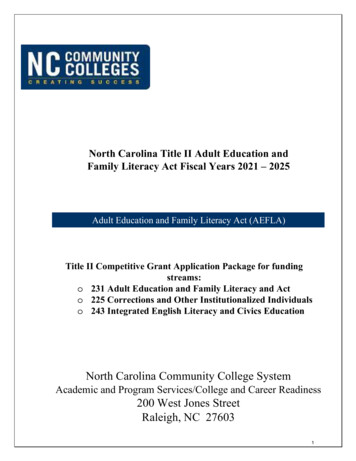
Transcription
North Carolina Title II Adult Education andFamily Literacy Act Fiscal Years 2021 – 2025Adult Education and Family Literacy Act (AEFLA)Title II Competitive Grant Application Package for fundingstreams:o 231 Adult Education and Family Literacy and Acto 225 Corrections and Other Institutionalized Individualso 243 Integrated English Literacy and Civics EducationNorth Carolina Community College SystemAcademic and Program Services/College and Career Readiness200 West Jones StreetRaleigh, NC 276031
Title II Competitive Grant ApplicationPart IA2
Table of ContentsANNOUNCEMENT OF FUNDING AVAILABILITY 4OVERVIEW OF FEDERAL AND STATE REGULATIONS . 5GENERAL GUIDANCE FOR FISCAL YEARS 2021-25 AEFLA - Title II, Section 231 . 7APPLICATION SUBMISSION GUIDELINES . . 7APPLICATION COMPONENTS . . 7AEFLA, TITLE II GRANT APPLICATION TIMELINE . . 8FY 2021 – 2025 North Carolina Adult Education COMPETITIVE GRANT APPLICATION Cover Page . 9DEMONSTRATED EFFECTIVENESS AND SCREENING TOOL . 10FEDERAL STATEMENT OF ASSURANCES 2021-2025 . 13SIGNATURE OF AGREEMENT . . . 15COLLEGE AND CAREER READINESS (CCR) STATEMENT OF ASSURANCES 2021-2025 . . . . 16SIGNATURE OF AGREEMENT . . . . . 17GENERAL EDUCATION PROVISIONS ACT. . . . 18AEFLA 231 COMPETITIVE GRANT APPLICATION QUESTIONS . . . 20CAPACITY AND COMMITMENT . . 21Consideration 1 . . 21Consideration 2 . .22Consideration 3 . . 23Consideration 4 . . 24INSTRUCTIONAL PRACTICES . . 25Consideration 5 . . 25Consideration 6 . . 26Consideration 7 . . 27Consideration 8 . . 28Consideration 9 . .29SERVICE INTEGRATION AND MANAGEMENT . 30Consideration 10 . . 30Consideration 11 . . 31Consideration 12 . .32Consideration 13 . .33APPLICATION SUBMISSION INSTRUCTIONS . . 34Title II, AEFLA 231 BUDGET APPROVAL. . . 37BUDGET NARRATIVE . . . . 38CORRECTIONS AND OTHER INSTITUTIONALIZED INDIVIDUALS SUPPLEMENTAL QUESTIONS . . . . 49INTEGRATED ENGLISH LANGUAGE AND CIVIC EDUCATION SUPPLEMENTAL QUESTIONS . . . . . . 65Title II Competitive Grant Application Rubrics. . . . . . 82References and Resources. . . . . .1073
FY 2021-25 North Carolina Adult Education Competitive Grant ApplicationANNOUNCEMENT OF FUNDING AVAILABILITYADMINISTRATIVE AGENCY:North Carolina Community College SystemAcademic and Program ServicesOffice of College and Career Readiness200 West Jones Street, Raleigh, North Carolina 27603FUNDING AUTHORITY:Workforce Innovation and Opportunity ACT (WIOA) of 2014, Title II AdultEducation and Family Literacy Act.FUNDING YEARS:July 1, 2021 – June 30, 2025BIDDERS’ MEETING:January 27, 2021 A virtual overview of the Title II Competitive GrantApplication Package for 2021-2025 will be posted career-readinessELIGIBLE APPLICANTS:An organization that has demonstrated effectiveness in providing adulteducation and literacy activities that may include: a local educationagency; a community-based literacy organization or faith-based organization; avolunteer literacy organization; an institution of higher education; a public orprivate nonprofit agency; a library; a public housing authority; a nonprofitinstitution that is not described previously and has the ability to provideliteracy services to eligible individuals; a consortium or coalition of agencies,organizations, institutions, libraries, or authorities described previously; apartnership between an employer and an entity described above. All fundedproviders are expected to meet or exceed the State negotiated target formeasurable skill gains. To be considered an eligible applicant, demonstratedeffectiveness is required. Demonstrated effectiveness is a requirement for theAEFLA - Title II, 231 grant. Eligible applicants must submit a fullycompleted application to be considered for funding.March 24, 2021 at 5:00 p.m.APPLICATION SUBMISSION DEADLINE:INQUIRIES:All application inquiries must be in writing and emailed to the attention ofNancye Gaj, Assistant Director of Adult Education, atgajn@nccommunitycolleges.edu. Place in the subject line “Title II, 231Application Question.” The question and answer period will begin on February3, 2021 and end on February 10, 2021. Application questions and their answersfrom this period will be posted areerreadiness/wioa-aefla by February 17, 2021. Questions will not receive anindividual email response.4
OVERVIEW OF FEDERAL AND STATE REGULATIONSThe Workforce Innovation and Opportunity Act (WIOA), 29 USC § 3101, et seq., signed into law on July22, 2014, created a new vision for how America prepares an educated and skilled workforce thatexpands opportunities for workers and employers. The 21st century public workforce development systemcreated through WIOA builds closer ties between business leaders, State and Local Workforce DevelopmentBoards (LWDB), labor unions, community colleges, nonprofit organizations, youth-serving organizations, andstate and local officials to deliver a more job-driven approach to training and skills development.Adult Education programs need to enhance and develop new, innovative opportunities through increasedcollaboration with core and non-core partners in creating and accelerating career pathways. By leveraging eachagency’s strengths and resources, each WIOA partner can do what it does best to contribute to a more robustservice delivery that will increase performance and program outcomes. The State of North Carolina UnifiedPlan articulates these priorities. North Carolina Community College System (NCCCS), Academic andProgram Services/College and Career Readiness (CCR), will award multi-year grants on a competitive basisto eligible providers within the State of North Carolina to develop, implement, and improve adult educationand literacy in North Carolina. Funding is contingent upon the availability of funds from the United StatesDepartment of Education.Application InstructionsUsing this application packet, an applicant may apply for the one, or all three Title II funded grant opportunities.All applicants must submit parts I-A and I-B to be considered for review. Part I-B includes the grantapplication narrative (13 Considerations).Please note, the 13 Considerations will satisfy the narrative requirements for AEFLA grant 231.Additionally, supplemental questions must be completed for 225 and 243 funding.For AEFLA grant 231, applicants must submit the following materials: Completed 231 Budget DocumentCompleted 231 Budget NarrativeEach funding stream application must be submitted as one separate PDF.For the Corrections and Other Institutionalized Individuals grant, applicants must submit the following materials: 225 Narrative - Supplemental Questions225 Budget Document225 Budget NarrativeEach funding stream application must be submitted as one separate PDF.For the Integrated English Literacy and Civics Education grant, applicants must submit the following materials: 243 Narrative - Supplemental Questions243 Budget Document243 Budget NarrativeEach funding stream application must be submitted as one separate PDF.5
Local Workforce Development BoardAll Title II 231 adult education applications are required to be aligned with all the WIOA LWDB plans within theworkforce development region. The adult education application will be reviewed by the LWDBs in which theadult education provider serves students. The LWDB will review the adult education application to ascertain theextent to which the application addresses the adult education and literacy needs identified in the LWDB plans. Anevaluation will be provided by the LWDB, indicating whether or not the applicant addresses the adult educationand literacy needs identified in the LWDB’s plan. The evaluation provided by the LWDB will be included as partof the overall review process.The grant applications will then be returned to the NCCCS-CCR for evaluation by external grant reviewers. Eachapplication will be evaluated using a rubric addressing the seven requirements and thirteen considerations of theWIOA Title II, Adult Education, and Family Literacy Act.Application Review ProcessA maximum of 52 points may be earned on the 231 application. A minimum of 36 points must be earned for theapplication to be funded. Each application will be read by a team of individuals who are professionals in adulteducation and literacy from outside the state of North Carolina. These readers will independently review andscore each of the applications assigned to them. Their scores will be submitted into the reviewers' portal. Nextthese scores will be averaged by the CCR Compliance Team, arriving at one final score for each 231 application.Reviewers will not provide written comments about the application responses. The scores arrived at through thisprocess are considered final and may not be appealed.A maximum of 20 points may be earned on the 225 Corrections and Other Institutionalized Individualssupplemental questions. A minimum of 14 points must be earned for the application to be funded. Eachapplication will be read by a team of individuals who are professionals in adult education and literacy fromoutside the state of North Carolina. These readers will independently review and score each of the applicationsassigned to them. Their scores will be submitted into the reviewers' portal. Next these scores will be averaged bythe CCR Compliance Team, arriving at one final score for each 225 application. Reviewers will not providewritten comments about the application responses. The scores arrived at through this process are considered finaland may not be appealed.A maximum of 20 points may be earned on the 243 Integrated English Literacy and Civics Educationsupplemental questions. A minimum of 14 points must be earned for the application to be funded. Eachapplication will be read by a team of individuals who are professionals in adult education and literacy fromoutside the state of North Carolina. These readers will independently review and score each of the applicationsassigned to them. Their scores will be submitted into the reviewers' portal. Next these scores will be averaged bythe CCR Compliance Team, arriving at one final score for each 243 application. Reviewers will not providewritten comments about the application responses. The scores arrived at through this process are considered finaland may not be appealed.Records MaintenanceAll documents related to the Title II Competitive Grant Application, including the application and reviewmaterials, will be maintained for five years from the application date in a secure location at the North CarolinaCommunity College System Office.6
GENERAL GUIDANCE FOR FISCAL YEARS 2021-25AEFLA - Title II, Section 231APPLICATION SUBMISSION GUIDELINESAPPLICATION SUBMISSION DEADLINE:An application containing all required materials mustbe submitted via the grant submission portal athttp://moodle.nccommunitycolleges.edu no laterthan 5 p.m. EST, March 24, 2021. Applicationsnot received by the March 24 deadline will notbe reviewed. A hard copy of this grant applicationwill not be accepted.APPLICATION COMPONENTS:Application components that must be submittedfor Part I-A are:1.2.3.4.5.6.7.Cover pageDemonstrated Effectiveness Screening ToolAll Memoranda of Understanding with the LocalWorkforce Development Board(s)Signed Federal and State Certifications andAssurancesSigned GEPA Form and attached explanationJob Description for Data Manager PositionSample Instructional Schedule (schedule shouldinclude information for Considerations 5 and 11.)7
AEFLA, TITLE II GRANT APPLICATION TIMELINEFY 2021-25ActivityDateRFP Release DateJanuary 2021RFP Guidance ReleaseJanuary 27, 2021Grant applications due to NCCCS-CCRMarch 24, 2021Demonstrated Effectiveness Screening and ApplicationCompletion ReviewMarch 31, 2021Applications and evaluation rubric sent to LWDBApril 7, 2021Deadline for LWDBs to return rubrics to NCCCS-CCRApril 21, 2021Evaluation of ApplicationsApril 28-May 26, 2021Grant Award Effective DateJuly 1, 20218
FY 2021 – 2025 North Carolina Adult EducationCOMPETITIVE GRANT APPLICATIONCover PageEligible Provider:Program Director:Email address: Phone No.:Local Workforce Development Board Region:County(s) Served (select all that apply) Alamance Alexander Alleghany Anson Ashe Avery Beaufort Bertie Bladen Brunswick Buncombe Burke Cabarrus Caldwell Camden Carteret Caswell Catawba Chatham Cherokee Chowan Clay Cleveland Columbus Craven Cumberland Currituck Dare Davidson Davie Duplin Durham Edgecombe Forsyth Franklin Gaston Gates Graham Granville GreeneEligible Provider (select one) Guilford Halifax Harnett Haywood Henderson Hertford Hoke Hyde Iredell Jackson Johnston Jones Lee Lenoir Lincoln McDowell Macon Madison Martin Mecklenburg Mitchell Montgomery Moore Nash New Hanover Northampton Onslow Orange Pamlico Pasquotank Pender Perquimans Person Pitt Polk Randolph Richmond Robeson Rockingham Rowan Rutherford Sampson Scotland Stanly Stokes Surry Swain Transylvania Tyrrell Union Vance Wake Warren Washington Watauga Wayne Wilkes Wilson Yadkin YanceyOtherOther:Note: This public body does not discriminate against faith-based organizations or against an applicantbecause of race, religion, color, sex, national origin, age, disability, or any other basis prohibited by State lawrelating to discrimination in employment.9
Demonstrated EffectivenessThe only organizations that are defined as "eligible" to apply for Title II AEFLA funds through the competitive grantapplication process are those that have "demonstrated effectiveness" in providing adult education and literacy activities.These organizations may include but are not limited to a) local education agency; b) community-based or faith-basedorganization; c) volunteer literacy organization; d) institution of higher education; e) public or private nonprofit agency; f)library; g) public housing authority; h) nonprofit institution that is not described in any of the subparagraphs (A) though(G) and has the ability to provide adult education and literacy activities to eligible individuals; (I) a consortium or coalitionof the agencies, organizations, institutions, libraries, or described in any of subparagraphs (A) through (H); and j) apartnership between an employer and an entity described in any of the subparagraphs (A) through (I). Section 463.24 ofTitle II further permits other organization types, even if not specifically listed, to apply if they meet the demonstratedeffectiveness requirement. The intent of applying a demonstrated effectiveness measure is to ensure that organizationsreceiving AEFLA funds have proven they can provide activities to individuals in an effective manner and produce goodoutcomes.Per 34 CFR § 463.23, NCCCS Office of College and Career Readiness CAN ONLY review applications for eligibleorganizations with a completed demonstrated effectiveness table. Demonstrated effectiveness is a federal requirement forscoring adult education and literacy activity applications.Section 463.24 of Title 34 of the Code of Federal Regulations addresses how an applicant “demonstrateseffectiveness.”“§ 463.24 How must an eligible provider establish that it has demonstrated effectiveness?a. For the purposes of this section, an eligible provider must demonstrate past effectiveness by providingperformance data on its record of improving the skills of eligible individuals, particularly eligible individualswho have low levels of literacy, in the content domains of reading, writing, mathematics, English languageacquisition, and other subject areas relevant to the services contained in the State's application for funds. Aneligible provider must also provide information regarding its outcomes for participants related to employment,attainment of secondary school diploma or its recognized equivalent, and transition to postsecondaryeducation and training.The Adult Education and Family Literacy Act (AEFLA), Title II of the Workforce Innovation and Opportunity Act (WIOA), P.L.113-128, requires State eligible agencies to award multiyear grants or contracts to eligible providers within the State. 29USC 3321, P.L. 113-128 § 231 34 CFR 463.20(a). The grants are awarded using a competitive process. To be eligible for anaward, an applicant must be an “eligible provider” that has “demonstrated effectiveness” in providing adult educationand literacy services. 29 USC 3272(5), P.L. 113-128 § 203(5).Before an application is fully evaluated in the competitive process, the application is reviewed to determine ifthe applicant is an “eligible provider” that has “demonstrated effectiveness.”Section 203(5) of WIOA, 29 USC 3172(5), provides that “[t]he term “eligible provider” means an organization that hasdemonstrated effectiveness in providing adult education and literacy activities that may include—A. a local educational agency;B. a community-based organization or faith-based organization;C. volunteer literacy organization;D. an institution of higher education;E. a public or private nonprofit agency;a library;F. a public housing authority;G. a nonprofit institution that is not described in (A) through (G) and has the ability to provide adulteducation and literacy activities to eligible individuals;H. a consortium or coalition of the agencies, organizations, institutions, libraries, or authorities described inany of subparagraphs (A) through (H); andI. a partnership between an employer and an entity described in any of subparagraphs (A) through (I).10
How demonstrated effectiveness is established:1. An eligible provider must demonstrateeffectiveness by providing performance data onits record of improving the skills of eligibleindividuals, particularly eligible individuals whohave low levels of literacy, in the contentdomains of: reading; writing; mathematics;English language acquisition: and other subjectareas relevant to the services contained in thestate's application for funds.2. An eligible provider must also provideinformation regarding its outcomes forparticipants related to: employment; attainmentof secondary school diploma or its recognizedequivalent; and transition to postsecondaryeducation and training.Two ways to demonstrate effectiveness :1. An eligible provider that has been funded underAEFLA as authorized by WIOA must provideperformance data required under section 116 todemonstrate effectiveness. This data is reportedannually through the National Reporting Systemand is collected via Colleague, Benchmark, andany other system furnished by the North CarolinaCommunity College System to funded providers.2. An eligible provider that has not been previouslyfunded under AEFLA as authorized by WIOAmust provide performance data to demonstrate itspast effectiveness in serving basic skills deficienteligible individuals, including evidence of itssuccess in achieving the two types of outcomeslisted above under the heading "Howdemonstrated effectiveness is established."11
Tittle II Adult Education Grant ApplicationDemonstrated Effectiveness TableReporting Period: 7/1/18 to 6/30/19Applicant Name:DemonstratedEffectiveness AreaImproving the skills ofeligible individuals whohave low levels of literacyin reading, writing,mathematics, Englishlanguage acquisition, andother subject areasrelevant to the servicescontained in theapplication.Performance Indicator# of Students Served% of StudentsDemonstrating Progress# of Unemployed atProgram Entry% of UnemployedStudents GainingEmploymentReadingWritingMathEnglish Language AcquisitionEmploymentOutcomes for participantsrelated to employment,attainment of secondaryschool diploma or itsrecognized equivalent, and Attainment of Secondary SchoolDiploma or Equivalenttransition to postsecondaryeducation and training.Transition to SecondaryEducation and Training# of Students Seeking% of Students Earning aHigh School Equivalency High School Equivalency# of Students Served% of Students Enrollingin PostsecondaryEducation and TrainingInstructionsPer 34 CFR § 463.24, applicants must demonstrate effectiveness in providing adult education and literacyactivities to individuals with low levels of literacy or English language learners. Prior to completing theapplication, each applicant must upload the Demonstrated Effectiveness Table by providing valid and reliabledata on its record of improving the skills of eligible individuals, particularly eligible individuals who have lowlevels of literacy in the following content domains: Reading, Writing, Mathematics, English language acquisition (if the applicant will offer an Englishlanguage acquisition program), and Other subject areas relevant to the services contained in the State'sapplication for funds.An applicant must also provide information regarding its outcomes for participants related to: Employment Attainment of secondary school diploma or its recognized equivalent, and Transition to postsecondary education and training.12
FEDERAL STATEMENT OF ASSURANCES2021 – 2025The recipient hereby assures that:1. It will comply with Title VI of the Civil Rights Act of 1964 (42 USC §2000d - §2000d-4) and itsimplementing regulations (34 CFR Part 100), and in accordance therewith, no person shall, on the groundsof race, color, or national origin, be excluded from participation in, be denied the benefits of, or beotherwise subjected to discrimination under any program or activity for which the applicant receivedFederal assistance.2. It will comply with Section 504 of the Rehabilitation Act of 1973, as amended (29 USC § 794), and itsimplementing regulations (34 CFR Part 104), which prohibits discrimination based on disability inprograms and activities receiving Federal financial assistance.3. It will comply with Title II of the Americans with Disabilities Act, (42 USC §12134, et seq.), and itsimplementing regulations (28 CFR Part 35), which prohibit discrimination on the basis of disability topublic entities, or it will comply with Title III, (42 USC §12181 et seq.), and its implementing regulations(28 CFR Part 36), which prohibit discrimination on the basis of disability in public accommodations,whichever is applicable.4. It will comply with Title IX of the Education Amendments of 1972, as amended (20 USC §1681- §1683),and its implementing regulations (34 CFR Part 106), which prohibit discrimination on the basis of sex ineducation programs and activities receiving Federal assistance.5. It will comply with the Discrimination Act of 1975, as amended, (42 USC §6101, et seq.), and itsimplementing regulations (45 CFR Part 90), which prohibit discrimination on the basis of age inprograms or activities receiving Federal financial assistance.6. All contractors, subcontractors, sub-grantees or others with whom it arranges to provide services orbenefits to its students or employees in connection with its education programs or activities are notdiscriminating in violation of the above-cited statutes, regulations, guidelines and standards againstthose students or employees.7. It will administer each program in accordance with all statutes, regulations, program plans, policies andreapplications applicable to that program.8. It will adopt and use proper methods of administering each program, including (a) the enforcement ofanyobligations imposed by law on agencies, institutions, organizations, and other recipients responsibleforcarrying out each program, and (b) the correction of deficiencies in program operations that areidentified through audits, monitoring, or evaluation.9. It will cooperate in carrying out any evaluation of each program conducted by or for the NCCCS, theUnited States Department of Education or other Federal officials.10. It will retain all records relating to a program for which Federal funds are received for a period of five yearsafter the completion of the activity for which the funds are used or until such time greater than five years asall pending reviews or audits have been completed and resolved. The only exception to this rule is theindefinite maintenance of Adult High School (AHS) and High School Equivalency (HSE) records.11. It has adopted appropriate procedures to implement the terms of the Family Educational Rights andPrivacy Act of 1974, (20 USC §1232g) and its regulations (34 CFR Part 99).13
12. It shall repay all funds determined to be due to the Federal government because of a disallowancedecision in a manner deemed reasonable by the State or the Federal government.13. To the extent authorized by law, it shall indemnify, save, and hold harmless the State, its employees andagents, against any and all claims, damages, liability and court awards including costs, expenses andattorney’s fees incurred as a result of any act or omission by it, or its employees, agents, subcontractorsorassignees in its operation of the programs.14. It will maintain such records, including those pertaining to fiscal audit and program evaluation, andprovide access to records upon request to representatives of the NCCCS or the Unites StatesDepartment of Education.15. No smoking will occur within any indoor facility owned or leased or contracted for and utilized by it forprovision of routine or regular kindergarten, elementary, or secondary education, library services,health care or early childhood development services to children.16. It will make reports to the NCCCS or the United States Department of Education as may reasonably benecessary to enable those parties to perform their duties.17. It certifies, by submission of this assurance form and by incorporating this form by reference in each ofitsre-applications for Federal funds, that neither it nor its principles: Are presently debarred, suspended, proposed for debarment, declared ineligible, or voluntarilyexcluded from participation in any transaction by any Federal department or agency. Have within a three-year period preceding this re-application been convicted of or had a civiljudgment rendered against them for commission of fraud or a criminal offense in connection withobtaining, attempting to obtain, or performing a public (Federal, State, or local) transaction orcontract under a public transaction; violation of Federal or State antitrust statutes or commission ofembezzlement theft, forgery, bribery, falsification or destruction of records, making falsestatements, or receiving stolen property. Are not presently indicted for or otherwise criminally or civilly charged by a governmental entity(Federal, State, or local) with commission of any of the offenses enumerated above; and Have not within a three-year period, preceding this re-application had any public transactions(Federal, State, or local) terminated for cause or default.18. No Federal appropriated funds have been paid or will be paid, by or on behalf of the recipient, to anyperson for influencing or attempting to influence an officer or employee of an agency, a member ofCongress, an officer or employee of Congress, or an employee of a member of Congress in connectionwith the making of any Federal grant, the entering into of any cooperative agreement, and theextension, continuation, renewal, amendment, or modification of any Federal grant or cooperat
AEFLA, TITLE II GRANT APPLICATION TIMELINE FY 2021-25 . Activity Date. RFP Release Date January 2021 RFP Guidance Release January 27, 2021 Grant applications due to NCCCS-CCR March 24, 2021 Demonstrated Effectiveness Screening and Application Completion Review March 31, 2021 Applications and evaluation rubric sent to LWDB April 7, 2021
